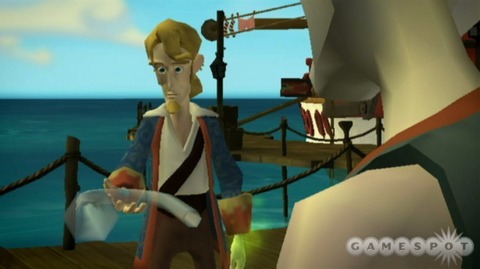Monkey Island to Portal: Whose story is it, anyway?
GDC Online 2011: Telltale Games design director Dave Grossman lays out different ways for developers to share the storytelling duties with their players, and how to make them still feel in control.
Who was there: Telltale Games design director Dave Grossman gave a presentation at the 2011 Game Developers Conference Online on the different ways game writers can tell the story they want while still letting players do what they want in the game.

What they talked about: Grossman began his talk by describing two polar-opposite approaches to providing players with gameplay. There's the open sandbox, where no authorial guidance is given and players are offered a paralyzing amount of freedom, and then there's the one where there's not enough player agency. He said neither of them are interactive, because there needs to be some back and forth between the author and the audience.
There's a spectrum that encompasses everything from books (a heavily authorial medium) to toys, which have designers but most of the enjoyment is created by the audience. In the middle, Grossman said there's actual conversation between two equals. Pen-and-paper games like Dungeons & Dragons also reside someplace near the middle, Grossman said. However, games fall in all along the spectrum, with Snakes and Ladders set up to give the creator of the game complete control, while Minecraft puts the responsibility for the experience almost entirely in the hands of the audience.
However, Grossman said it's not a linear spectrum, and game designers face an issue with choice of freedoms more so than the freedom of choice. He pointed to The Secret of Monkey Island and Portal, both of which are considered achievements in storytelling in games.
In Monkey Island, players have a lot of options at any given time, Grossman said, with nine different verbs to experiment with and an inventory full of items that modify those verbs. On the other hand, Portal has one main tool that is used to solve almost all of the player's problems. Monkey Island has an open environment where players can explore a bunch of different environments at their leisure, while Portal is a rigidly structured set of environments that happen in the same order every time. Monkey Island also has a wealth of goals for players to keep in mind at any given time, while Portal always has the single goal of making it to the end of each level.
Given all those assessments, one would think that Portal would be the more authorial controlled game, Grossman said. However, when asked subjectively which game feels like a more open experience, Grossman said Portal is almost universally considered the more open experience. That's the result of designers choosing exactly which parts of the game players had freedom with, Grossman said.
The key choices in Portal are made based on the way the physics of the world work, Grossman said, which is something that speaks to what he called the reptilian brain. However, the choices made in Secret of Monkey Island are based on the scripted ways people work in the game, and that speaks more to the frontal lobe of the brain.
Grossman pointed to a scene from the upcoming Walking Dead game, in which players will be in the back of a squad car, looking around the environment as the car drives through. A highway sign will inform players that they are on the outskirts of Atlanta, Georgia, provided they pay attention to it. Grossman likened it to The Truman Show, where the game designer/storyteller's objective is to ensure that players feel like they're in control of a great story, even when it's heavily authored.
They wound up centering the camera on the courthouse, and players would find walking elsewhere uncomfortable because it brought the main character too close to the camera.In a more open game, for example, Grossman said the designer can use architecture as a subtle lure to attract players where they need to be. For Telltale's Back to the Future, Grossman said they had a sequence where they wanted to guide the player to a courthouse without resorting to a cutscene. They wound up centering the camera on the courthouse, and players would find walking elsewhere uncomfortable because it brought the main character too close to the camera. Grossman said that violated their sense of personal space and made them more likely to explore the courthouse instead.
Designers can also impact what people do in a sandbox based on the tools they give players, as well as how they portray them. For example, player actions will change depending on whether the designer gives the player a fishing pole, a shovel, or a watering can. Grossman talked about the portal gun in Portal and how it inherently lets players break the rules, which further speaks to the character of Chell and her motivations.
It's also important to consider how clearly the choices are conveyed to players. He pointed to sequences from Monkey Island, where over the course of the game, the dialogue options ran the gamut of player freedom. Some dialogue scenes had an obvious right choice and a handful of joke choices, others had a variety of equally interesting and viable options, while others presented players with four separate ways to say essentially the same thing.
Quote: "It's telling what choices you are given, and more importantly, what choices you are not given."--On making players feel like they're in control in an enjoyably guided experience.
Takeaway: Grossman said designers should think of themselves as partly storytellers, and storytellers should be partly designers as well. There's a time and a place for both to exert their authorial influence at the expense of player freedom, just as there are times to give up control and let players direct the experience themselves.
Got a news tip or want to contact us directly? Email news@gamespot.com
Join the conversation